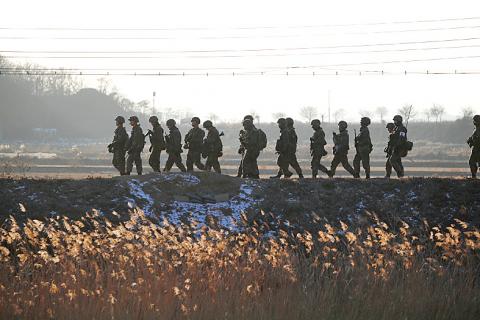North and South Korea yesterday reopened a cross-border hotline that had been shut down since 2016, forging ahead with peace overtures despite taunts from US President Donald Trump, who said he has a “much bigger” nuclear button than North Korean leader Kim Jong-un.
The hotline was restored after Seoul proposed high-level talks in response to an olive branch from Kim, who has offered to send a team to next month’s Winter Olympics in the South.
“The phone conversation lasted 20 minutes,” a South Korean Ministry of Unification official said, adding that details were not known immediately.

Photo: Reuters
Kim during his new year address included a warning to the US that he has a “nuclear button” on his table, prompting a furious response from Trump.
“North Korean Leader Kim Jong Un just stated that the ‘Nuclear Button is on his desk at all times.’ Will someone from his depleted and food starved regime please inform him that I too have a Nuclear Button, but it is a much bigger & more powerful one than his, and my Button works!” Trump said on Twitter.
The tweet generated responses largely of scorn and alarm.
“Our President is a child. ‘Mine is bigger than yours’ may sound tough on the playground, but this is no juvenile affair. Literally millions of lives are at stake,” former US national security adviser Colin Kahl said on Twitter.
However, US Ambassador to the UN Nikki Haley maintained a tough line, playing down Seoul’s offer to hold talks.
These would be a “Band-Aid” unless denuclearization was also up for discussion, she said.
US Department of State spokesman Heather Nauert also said that Kim “may be trying to drive a wedge of some sort between the two nations — between our nation and [South Korea].”
However, the tentative rapprochement seemed to be moving ahead yesterday, with Kim welcoming Seoul’s support for his overtures, said Ri Son-gwon, chairman of the South Korean Committee for the Peaceful Reunification of the Country.
The hotline in the border truce village of Panmunjom remained operational until February 2016, when it was shut down over a dispute involving the jointly operated and now closed Kaesong Industrial Complex.
Seoul welcomed Pyongyang’s decision to reopen the hotline as “very significant.”
Asan Institute for Policy Studies research fellow Go Myong-hyun said that North Korea was using the South as a “shield” as it tries to fend off sanctions and pressure from the US.
“If the South becomes the North’s dialogue partner, the US-South Korea alliance will face difficulties,” he said.

CHAOS: Iranians took to the streets playing celebratory music after reports of Khamenei’s death on Saturday, while mourners also gathered in Tehran yesterday Iranian Supreme Leader Ayatollah Ali Khamenei was killed in a major attack on Iran launched by Israel and the US, throwing the future of the Islamic republic into doubt and raising the risk of regional instability. Iranian state television and the state-run IRNA news agency announced the 86-year-old’s death early yesterday. US President Donald Trump said it gave Iranians their “greatest chance” to “take back” their country. The announcements came after a joint US and Israeli aerial bombardment that targeted Iranian military and governmental sites. Trump said the “heavy and pinpoint bombing” would continue through the week or as long

TRUST: The KMT said it respected the US’ timing and considerations, and hoped it would continue to honor its commitments to helping Taiwan bolster its defenses and deterrence US President Donald Trump is delaying a multibillion-dollar arms sale to Taiwan to ensure his visit to Beijing is successful, a New York Times report said. The weapons sales package has stalled in the US Department of State, the report said, citing US officials it did not identify. The White House has told agencies not to push forward ahead of Trump’s meeting with Chinese President Xi Jinping (習近平), it said. The two last month held a phone call to discuss trade and geopolitical flashpoints ahead of the summit. Xi raised the Taiwan issue and urged the US to handle arms sales to

State-run CPC Corp, Taiwan (CPC, 台灣中油) yesterday said that it had confirmed on Saturday night with its liquefied natural gas (LNG) and crude oil suppliers that shipments are proceeding as scheduled and that domestic supplies remain unaffected. The CPC yesterday announced the gasoline and diesel prices will rise by NT$0.2 and NT$0.4 per liter, respectively, starting Monday, citing Middle East tensions and blizzards in the eastern United States. CPC also iterated it has been reducing the proportion of crude oil imports from the Middle East and diversifying its supply sources in the past few years in response to geopolitical risks, expanding

Pro-democracy media tycoon Jimmy Lai’s (黎智英) fraud conviction and prison sentence were yesterday overturned by a Hong Kong court, in a surprise legal decision that comes soon after Lai was jailed for 20 years on a separate national security charge. Judges Jeremy Poon (潘兆初), Anthea Pang (彭寶琴) and Derek Pang (彭偉昌) said in the judgement that they allowed the appeal from Lai, and another defendant in the case, to proceed, as a lower court judge had “erred.” “The Court of Appeal gave them leave to appeal against their conviction, allowed their appeals, quashed the convictions and set aside the sentences,” the judges